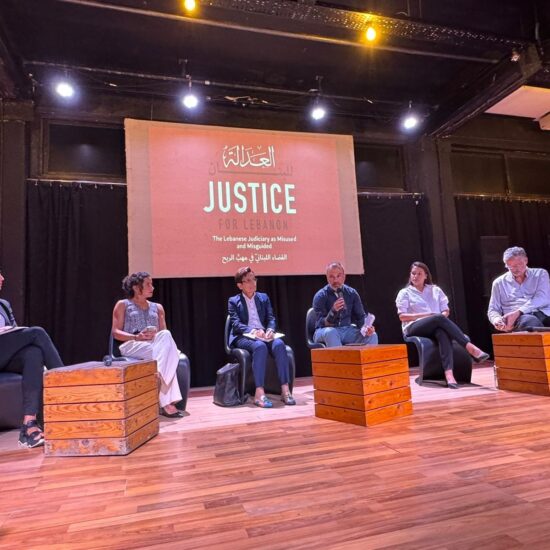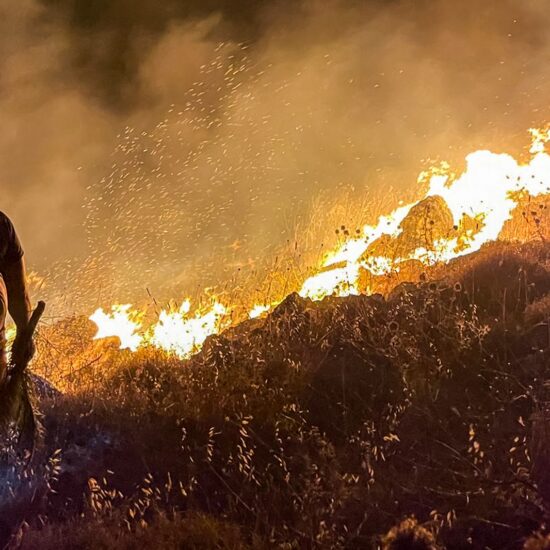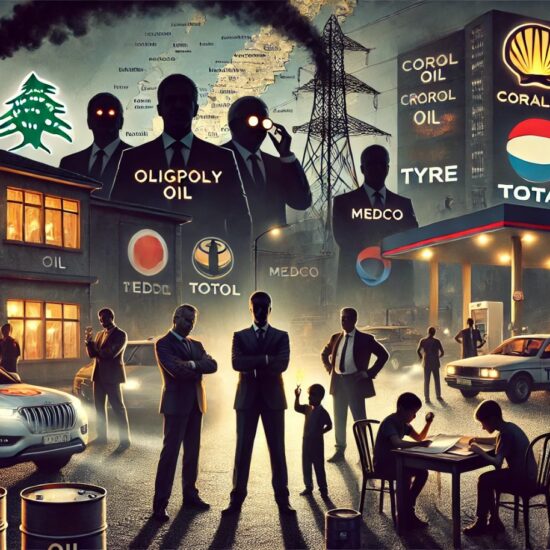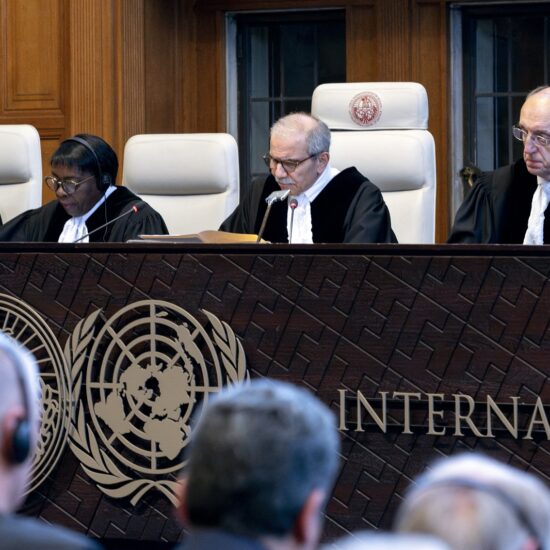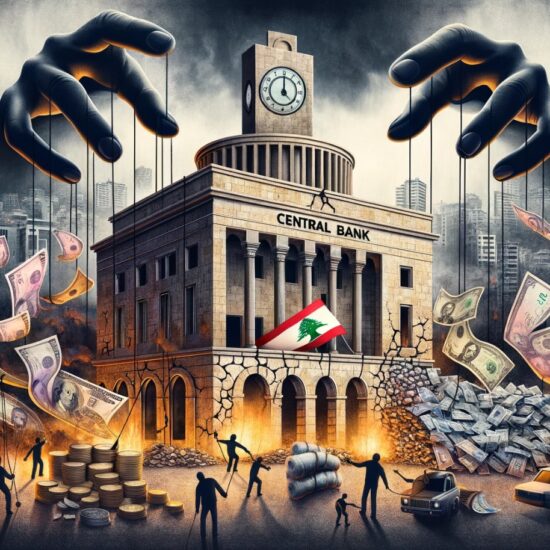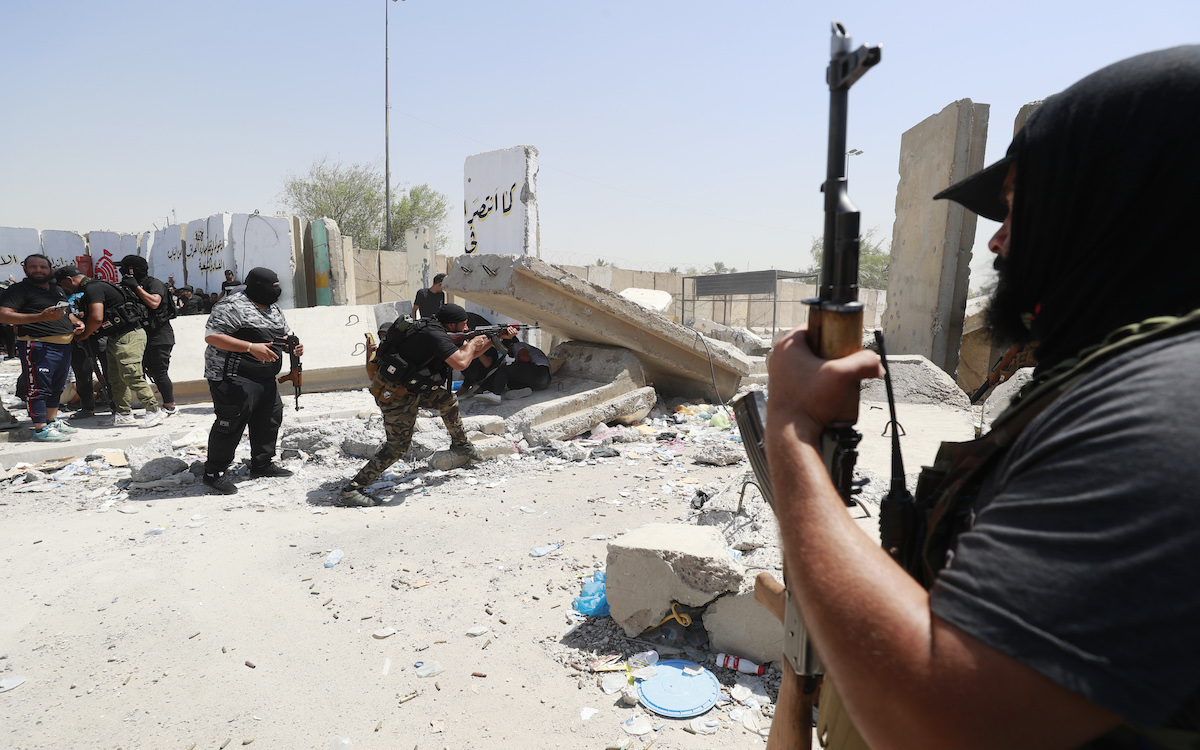
Though the Middle East’s political tectonic plates are always moving, things seem to be coming to a head throughout Iran’s sphere of influence.
In Lebanon, the possibility of war between Hezbollah and Israel continues to threaten the region’s already weak stability, and a potential civil war in Iraq could also be on the horizon.
What is happening in Iraq is paradoxically both an example of the limits of Iranian influence and the depth of the so-called Iranian crescent.
Muqtada al-Sadr and Iranian-backed groups in Iraq are on the brink of a civil war, as Iran has been unable to reel Sadr in.
Though he was once supported by Iran in his fight against the United States’s occupation of his country, he now is against both Iran and the US.
Some have said that it was another Iraqi Shiite Cleric, Ayatollah Ali al-Sistani, who persuaded Sadr to stand down in Baghdad, while others have pointed to Hezbollah’s Hassan Nasrallah as the one who convinced Sadr to withdraw his forces.
Either way, both men likely talked to Sadr, and this is perhaps more proof that Iran is unable to control the countries in its sphere of influence on its own.
After all, it has largely been Hezbollah that has done the heavy lifting in Syria, Iraq, and Yemen.
A good takeaway from these events is that Iranian influence is not set in stone, and though Iran may dominate the politics of Baghdad, Damascus, and Beirut, its power can be threatened by a variety of political actors.
Perhaps Sadr will ultimately have to stand down in the long run, but his millions of supporters may prefer that he continue his fight against the Iranians and the Americans.
Only time and interest will tell how solid Iran’s influence will be going forward.
In Lebanon
The crime of torture: Lebanese authorities arrested five State Security officers over the weekend who have been accused of torturing a young Syrian man to death.
Bashar Abdel Saud was arrested on August 31 and was taken to a facility in Bint Jbeil in southern Lebanon for questioning. The security officers believed that Abdel Saud was a cell leader for the Islamic State (IS) and tried to obtain a confession from him, but he denied his involvement with the militant group.
Abdel Saud was dead within three hours of his arrest, and his body showed signs of torture.
Though torture was banned in Lebanon in 2017, the practice has unfortunately continued.
Abdel Saud’s death also comes as anti-refugee sentiment in Lebanon has skyrocketed in recent months, with calls by politicians of all stripes to return Syrian refugees to Syria, where they face a myriad of abuses.
I wrote about the topic back in July.
Internet strike: Employees of Lebanon’s state-owned telecom company went on strike last week, demanding higher wages, leading to internet disruptions across the country.
Striking Ogero employees said that they want their salaries raised after the government’s recent hike on telecom fees and internet subscriptions, with some of their salaries reportedly now worth about $125.
MP Paula Yacoubian indicated that the parliament would discuss the issue on Monday September 5, but, as always, it is unlikely that anything productive will occur.
Internet and phone service have been steadily declining, especially in recent months, with many complaining about internet speeds so slow it is nearly impossible to access the web.
More pressure: It seems that Lebanon’s central bank may soon lift fuel subsidies.
The price of fuel has already become unaffordable for many, as only around 20% of Lebanon’s fuel is reportedly subsidized.
🇱🇧⛽️💵 #Lebanon‘s Central Bank could soon lift remaining subsidies on petrol, gas station owners’ spox @brax_georges said.
He says just 20% of petrol is subsidized.
Lebanon has been slowly lifting fuel subsidies over the past year, as its $ reserves continue to drain.
— Kareem Chehayeb | كريم شهيب (@chehayebk) September 5, 2022
This comes as the Lebanese Lira continues to lose value, with the current rate being about 35000 Lira to the dollar. This most recent bout of inflation has interfered with businesses.
The maritime border: Lebanon and Israel are said to be moving closer to a deal regarding Lebanon’s maritime border, with Amo Hochstein, the US’s chief negotiator, to visit Beirut this week.
It seems both sides are closing in on a deal, but time is running out before a potential military confrontation between Hezbollah and Israel breaks out.
Hezbollah has said that if a deal is not reached by mid-September, it would intervene to prevent Israel from extracting gas from the Karish field.
Indeed, it seems that the likelihood of another Lebanon war has not been this high since 2006, the last time Hezbollah and Israel confronted each other.
The deal that looks to be on the horizon stipulates that Israel will ultimately keep the Karish field, while Lebanon will get the Qana field, which is just north of it.
There was also a recent act of protest, as boats set sail from Tripoli in the north to al-Naqoura in the south to demand Lebanon’s right to its natural resources.
Military flexing: As tensions on Lebanon’s southern border continue to mount, Israel has announced that it will launch military drills on the border, starting on Sunday, September 4, and ending on Tuesday, September 6.
At the same time, Hezbollah has been preparing its military forces for a confrontation.
Though the Israelis said that the drills were pre-planned, and not a reaction to recent developments, the timing does seem a bit convenient.
Both sides want to flex their military might for leverage in negotiations, but it is Hezbollah that has the most to show off.
Hezbollah’s military capabilities have greatly increased since 2006, and Israel is keenly aware that a war with Hezbollah is not like its attacks on Gaza.
Hezbollah has the capacity to respond to Israeli attacks with precision missiles that carry far larger payloads, which certainly will affect Israel’s calculus.
Ultimately, war is never as likely as it may seem, but these tensions cannot be ignored either.
Hassan Shaaban protests: A protest was held in front of the Ministry of Interior regarding the recent threats against Hassan Shaaban.
بدعوةٍ من تجمّع #نقابة_الصحافة_البديلة، نظّمت، اليوم الجمعة، وقفة تضامنية مع المصوّر الصحفيّ #حسن_شعبان أمام وزارة الداخلية احتجاجاً على التهديدات المتواصلة التي يتعرّض لها على خلفية تصويره احتجاجات في #الجنوب.
./1 pic.twitter.com/Ut48OHtq1d— Megaphone (@megaphone_news) September 2, 2022
In the video released by Megaphone, new independent MPs Halimé Kaakour and Firas Hamdan can be seen in attendance.
Shaaban covered protests in the south last month focused on a water shortage in the area, but he was assaulted and threatened by Hezbollah members.
He then recently found a bottle of gas with batteries and a circuit board attached to it.
وفي التفاصيل، قال شعبان لمركز “سكايز”: “توجهت إلى سيارتي المركونة أمام منزلي في البلدة لأتوجه الى بيروت، فوجدت كرتونة بالقرب من الإطار الخلفي، وعندما حملت الكرتونة اكتشفت أنه يوجد بداخلها قنينة بنزين وبورد صغير فيه بطاريتان صغيرتان، حيث بدت أنها محاولة لإحراق سيارتي.@hasanshaaban pic.twitter.com/OkNg3WBRdT
— Samir Kassir Eyes (@SK_Eyes) September 1, 2022
NOW’s Dana Hourany spoke to Shaaban last month in her report regarding his targeting.
No more secrets: The International Monetary Fund (IMF) has urged the Lebanese officials to make new changes to its banking secrecy law passed in July but shot down by President Michel Aoun, as it reportedly has not resolved “key deficiencies.”
Lebanon has had banking secrecy laws since the 1950s, preventing investigations into financial mismanagement.
Since the beginning of Lebanon’s economic crisis, the IMF has demanded that the Lebanese government make serious reforms before it can access funds to help alleviate the crisis.
There are serious concerns that any money given to the Lebanese government will be stolen, like most aid and assets it handles.
Indeed, Lebanon is one of the most corrupt countries in the world, and it is hard to believe that the political class would even consider doing anything that could possibly hurt its finances and help the Lebanese people.
In the region
A tired city: Last week saw some of the worst fighting in Baghdad in recent years, with over 30 killed and hundreds wounded.
As I mentioned last week, Shiite cleric Muqtada al-Sadr declared the end of his political career, which essentially gave a green light to his supporters occupying the Iraqi parliament to move on other government buildings in the heavily fortified Green Zone.
As they marched on the Republican Palace, they came into conflict with counter-protesters who support the Coordination Framework Alliance (CFA) which is backed by Iran.
Eventually, as night fell, armed clashes erupted between Sadr’s militia, Saraya al-Salam, the Iran-backed Popular Mobilization Forces (PMF), and Iraqi security forces.
Sadr’s forces fired into the Green Zone for hours using small arms and RPGs.
The Iraqi government established a curfew, as violence spread to other parts of the country.
بعد ساعات من الاشتباكات والفوضى أعلن مقتدى الصدر سحب انصاره من الشوارع ومن المنطقة الخضراء. فما هي خلفية الاشتباكات الأخيرة ولماذا قرر الصدر مواجهة إيران ومن ثم الانسحاب؟ pic.twitter.com/8Z3BxvT8oq
— Daraj Media (@Daraj_media) August 31, 2022
Finally, by the morning, Sadr called for his forces to withdraw from the capital and apologized for the violence.
Though it seemed like violence had subsided, clashes broke on in Basrah a few days later on September 1.
On Monday, September 5, a “national dialogue” was held in Baghdad to alleviate tensions between Sadr and Iran-backed groups.
The dialogue included leaders of political parties from the Shiite, Sunni and Kurdish blocs, but Sadr himself refused to attend.
Small victories: Khalil Awawdeh, Palestinian man who went on a 172-day hunger strike, has ended his strike last week, saying that Israeli authorities have agreed to release him.
The taste of victory following months of fighting for a basic human right.
The fist cup of tea in 6 months for #KhalilAwawdeh who just suspended his 171-day hunger strike in protest of his administrative detention in Israeli jails without charge or trial. pic.twitter.com/FpauQvRDBx
— Maha Hussaini (@MahaGaza) September 1, 2022
This comes as 1200 Palestinian prisoners in Israeli detention also agreed to end a one-day hunger strike that was prompted by Israel reneging on an agreement to end certain punitive measures in its prisons.
Continued oppression: Israel has implemented a controversial new set of rules aimed at isolating the Palestinian population in the West Bank.
First announced in February, the rules would require foreigners to report romantic relationships with Palestinians to Israel’s Defense Ministry. They also include restrictions on universities in the West Bank and restrictions on foreign access to the area.
These rules come as criticism of Israel continues to mount, as more and more institutions, human rights groups, and even Israeli politicians acknowledge that the situation is, at the very least, similar to apartheid.
Israel has also been targeting both Palestinian and international human rights groups, either shutting their offices completely or limiting their access.
Disabled airports: Israel targeted Aleppo’s main airport last week, leading to its temporary closure. There were also reports that a military base near the Damascus airport was also attacked.
Israel has struck Syria on a nearly weekly basis in its quiet war with Iran and its allies operating in the country.
In June, Israel struck the Damascus airport, leading to its temporary closure for a few days.
In addition to these recent strikes on Aleppo and Damascus, there was also a strike recently in the Hama town of Masyaf that allegedly destroyed a missile storage facility.
There has been some speculation that these recent strikes aim to disrupt Iranian arms shipments to Hezbollah as tensions between the group and Israel continue to mount.
Victory or Egypt: Though it is often overlooked, protests in Sudan have continuously occurred against the military regime of Abdel Fattah al-Burhan, who took power in a coup almost a year ago last October.
It seems that the protesters and the military regime have come to a deadlock, as the military is unable to mend the Sudanese economy and the protests cannot garner a critical mass to fully overthrow the regime.
Over 100 people have died since October in protests against Burhan’s coup.
What we’re reading:
A forgotten city: Though Tripoli is Lebanon’s second-largest city, its people have been largely ignored since it was absorbed by Mount Lebanon 100 years ago. I write about the issue here.
Always the vulnerable: As Lebanon continues sinking deeper into its various crises, women and children are at more risk of violence. Dana Hourany investigated familial and social disintegration that threatens Lebanon’s future generations.
A polarizing figure: Muqtada al-Sadr perhaps believes that he is the sole legitimate representative in the country for his religious community, but he may be overstepping his capabilities, writes Sajad Jiyad for Newlines.
Lebanon+
Podcasts: Médéa Azouri & Mouin Jaber spoke with Lebanon’s young basketball star Wael Arakji about his sport and Lebanon’s current crisis on Sunday’s Sarde After Dinner podcast.
Until next week, follow NOW Lebanon on Twitter, Instagram, Facebook, and LinkedIn, and subscribe to our weekly newsletter. And stay safe.



